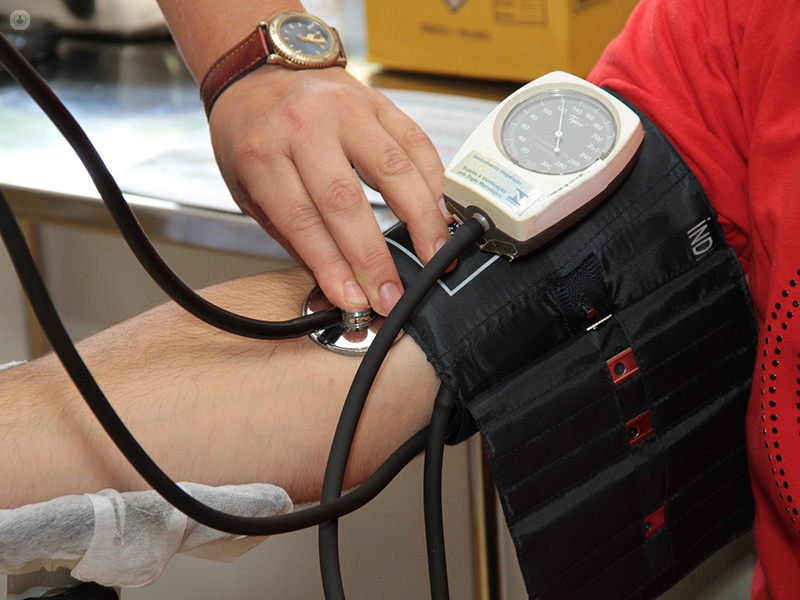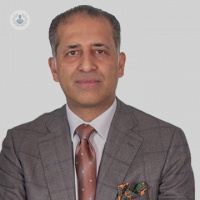Managing high blood pressure
Written in association with:Hypertension or high blood pressure is highly prevalent, with 1.13 billion people worldwide diagnosed with the condition, and this is predicted to increase to 1.5 billion by the year 2025. It’s the most common long term condition globally, affecting 20-25% of men and women, with a higher incidence of hypertension in emerging economies such as China and India.
Professor Melvin Lobo, a global expert in hypertension, who has led many studies regarding drugs to control hypertension, diagnostics and the use of multiple therapies and devices to control and manage high blood pressure talks to us about hypertension and the future of hypertension treatments.

Why is it important to treat high blood pressure?
High blood pressure is the number one factor for cardiovascular disease associated with stroke, heart attacks and renal impairment. Knowing how to successfully treat high blood pressure is vital to reduce cardio events and save lives.
How do you define hypertension?
There is much global difference in how hypertension is defined. New guidelines are to be released from NICE to redefine high blood pressure. Professor Lobo favours the definition by the European Society of Cardiology and European Society of Hypertension.
High blood pressure is defined as anything greater or equal to 140mm of mercury over 90mm. This can be measured either at home with a blood pressure monitoring device which is less expensive and easy to access, or with an ambulatory blood pressure monitoring device.
However, true blood pressure is impossible to measure because it is always changing, however, if a patient tests their blood pressure and it meets the definition of high, to avoid any risk of cardiovascular disease, they should report this to their GP as soon as possible.
When should people be tested for secondary causes of hypertension?
Five to ten cases of hypertension have an underlying treatable cause. If people are struggling to achieve hypertension control, even though they are taking hypertension drugs and are adhering to their treatment plan, it is suspected that there is a secondary cause for their hypertension and these patients should be examined further.
If hypertension is present at an early age, below the age of 30, especially if the patient is taking drugs for hypertension, then screening should be performed to avoid the risk of hypertensive heart failure or hypertensive emergencies.
What are some secondary causes of hypertension?
Some causes of hypertension are not so rare such as obstructive sleep apnoea that results in a failure of nocturnal dipping and requires 24hr monitoring. Treating sleep apnoea often significantly improves high blood pressure. Those with kidney disease or endocrine hypertension caused by diseases like Cushing’s are also associated with high blood pressure.
What drugs are recommended to treat hypertension?
ACE inhibitors or calcium channel blockers are used to treat hypertension but treatment depends on age and ethnicity. Caucasian men, over the age of 55 are recommended to start treatment with ACE inhibitors, while men over the age of 55 who are from African descent are recommended to start with calcium channel blockers.
However, now European guidelines are moving towards a more patient-centric approach to treatment. It’s fine to start treatment with one pill if high blood pressure is mild, but in more severe cases, numerous pills need to be taken. It’s much better to treat hypertension with a single pill that combines two or more active ingredients, rather than giving patients numerous pills.
Combined single pills have proven to be much more successful for better initial blood pressure control and long term benefits. This is because the more tablets people are prescribed the less likely they are to take all of them. Non-adherence is 70-80% in all those prescribed five to six tablets, that even includes people undergoing transplants and with heart failure. So a move towards a single pill that combines the ingredients of a number of pills is the best approach to improve patient compliance.
What does the future look like in five to ten years?
Two important improvements that need to be made are
1. Diagnostics
Conventional cusp based devices to measure blood pressure, whether at home or at the doctor’s clinic are fundamentally flawed. Systolic blood pressure can be under-read by 8mm and diastolic blood pressure can be over-read by 5mm to 6mm. This means that there is a need to reclassify the meaning of hypertension if 33% of all blood pressure monitoring devices have been found to provide inaccurate results. We also need to move away from cusp based measuring devices because they beep and disturb sleep when a patient needs to be monitored for 24 hours.
2. Non-pharmacological approaches
There is much research now that supports the claim that non-pharmacological therapies can effectively control blood pressure in highly controlled settings. Treatments such as renal sympathetic denervation, a minimally invasive endovascular catheter-based procedure using either radiofrequency ablation or ultrasound ablation to treat resistant hypertension can be used to treat high blood pressure without medication. Other treatments such as baroreflex activation therapy can also be used to treat resistant hypertension.
To conclude, current treatment is not secure, but non-pharmacological treatments need further investigation, they are not yet a replacement for conventional treatments. However, they teach us a lot about the treatment of hypertension and procedures targeted at the renal nerve, for example, are much cleaner and have fewer side effects than the drugs that are being used at present. With more rigorous clinical trials, the treatment of high blood pressure with non-pharmacological drugs looks promising.
Would you like more information about hypertension? Contact Professor Melvin Lobo.


